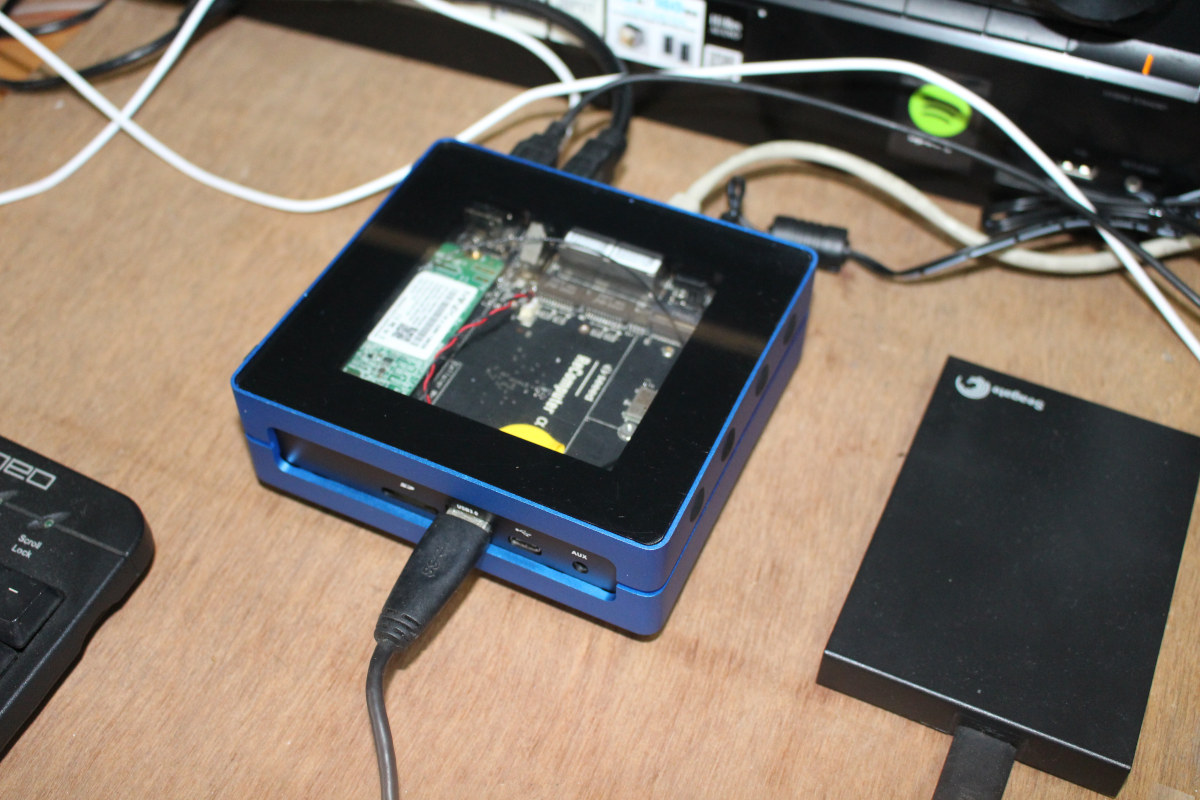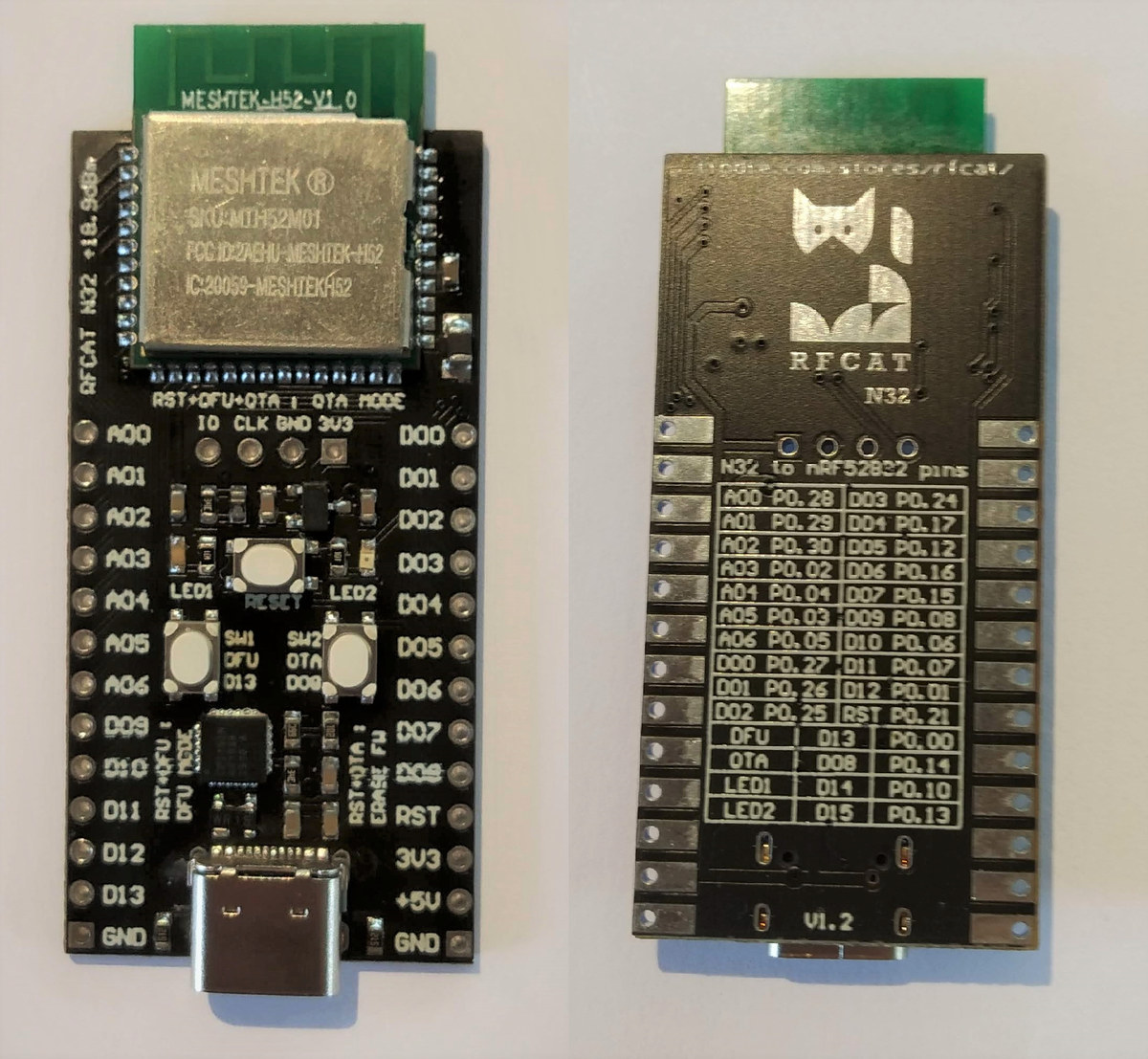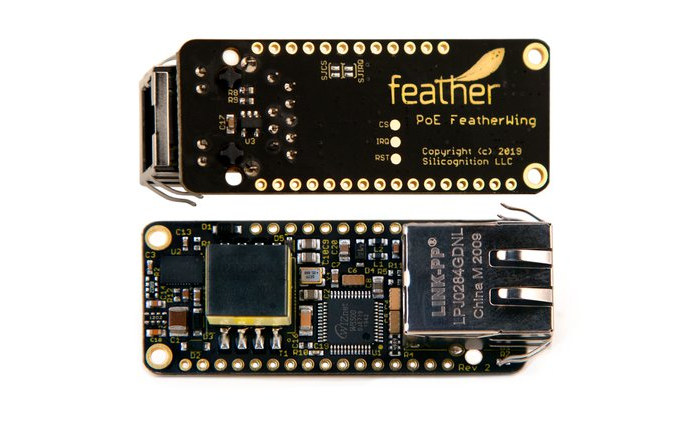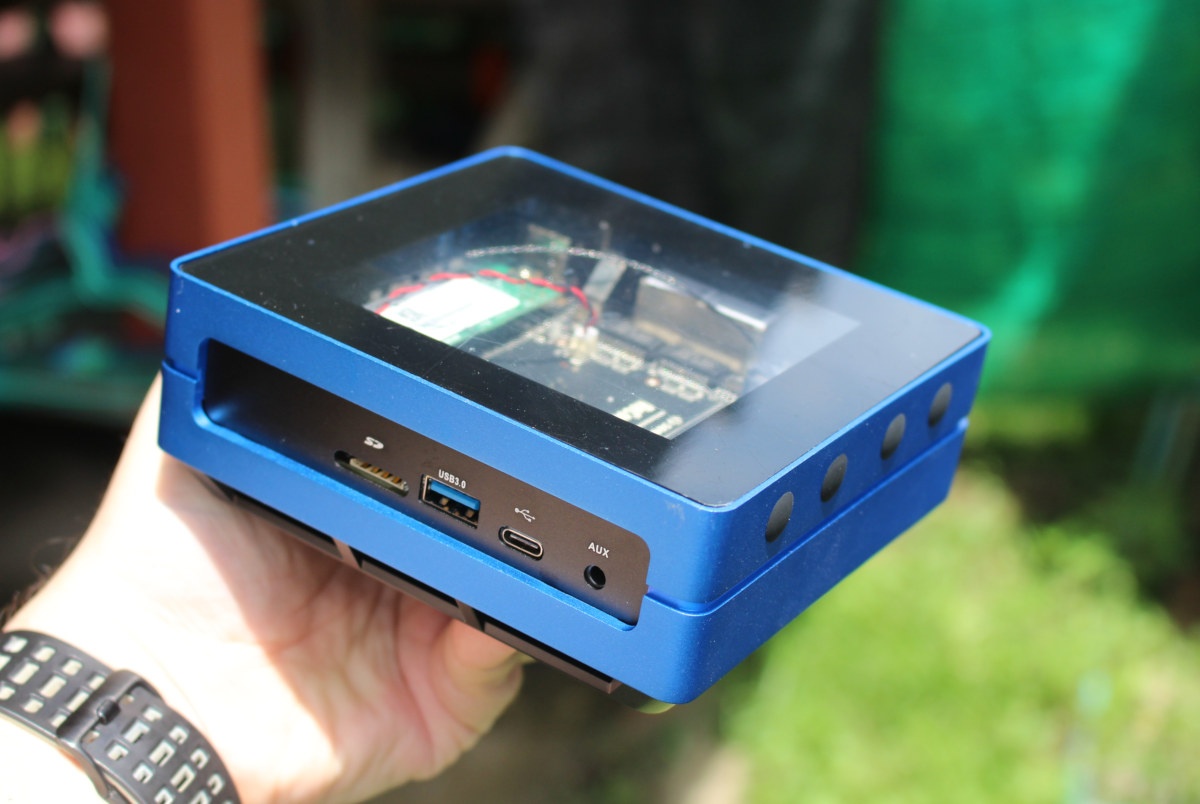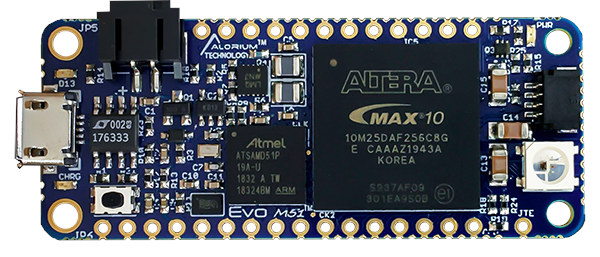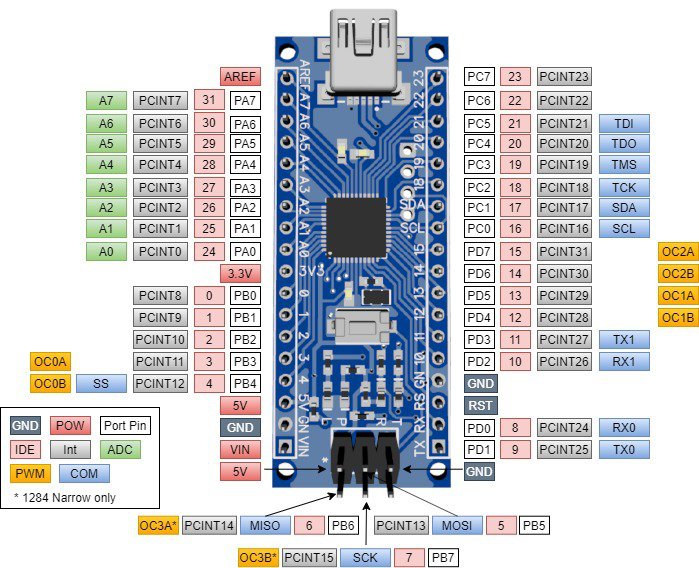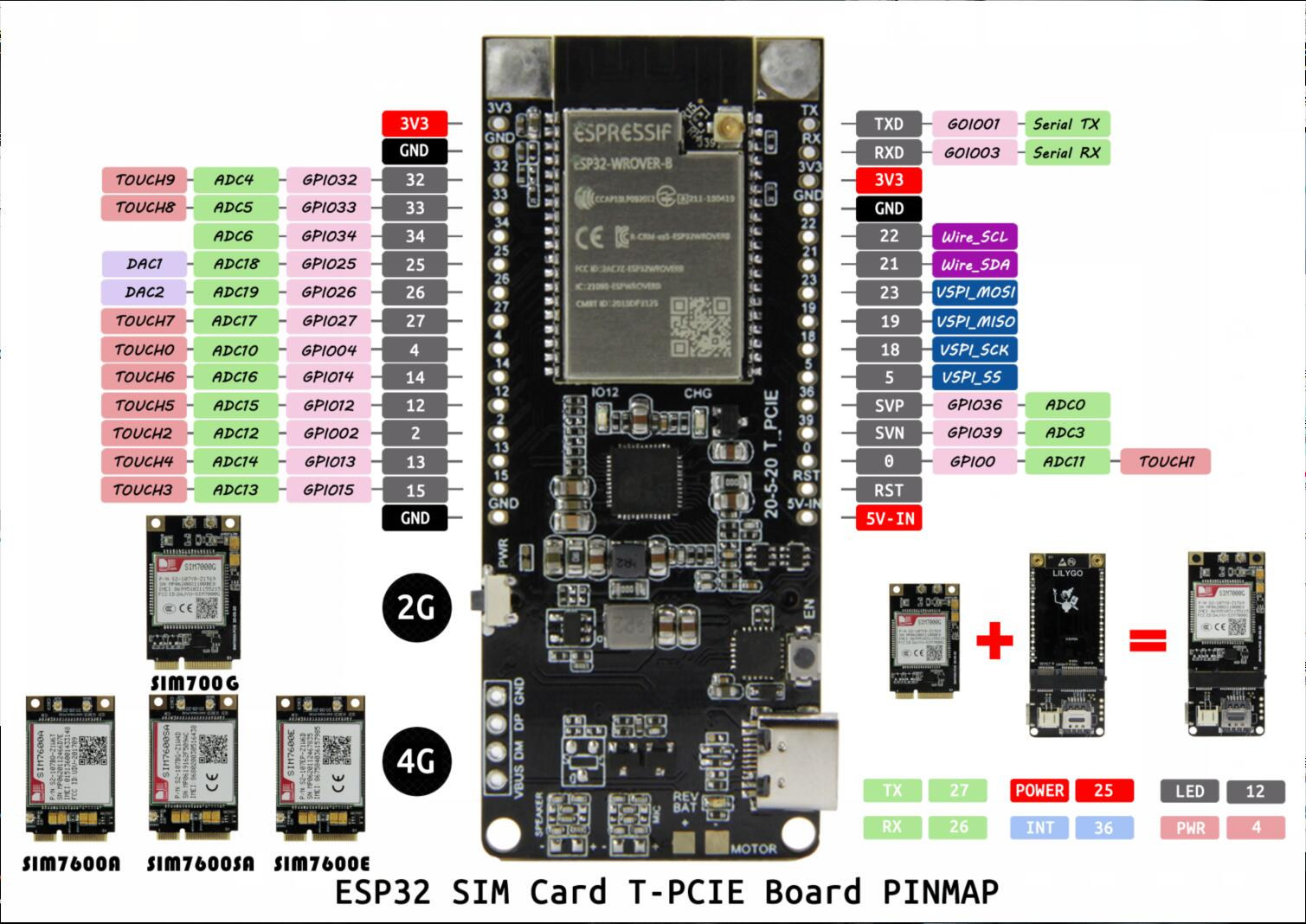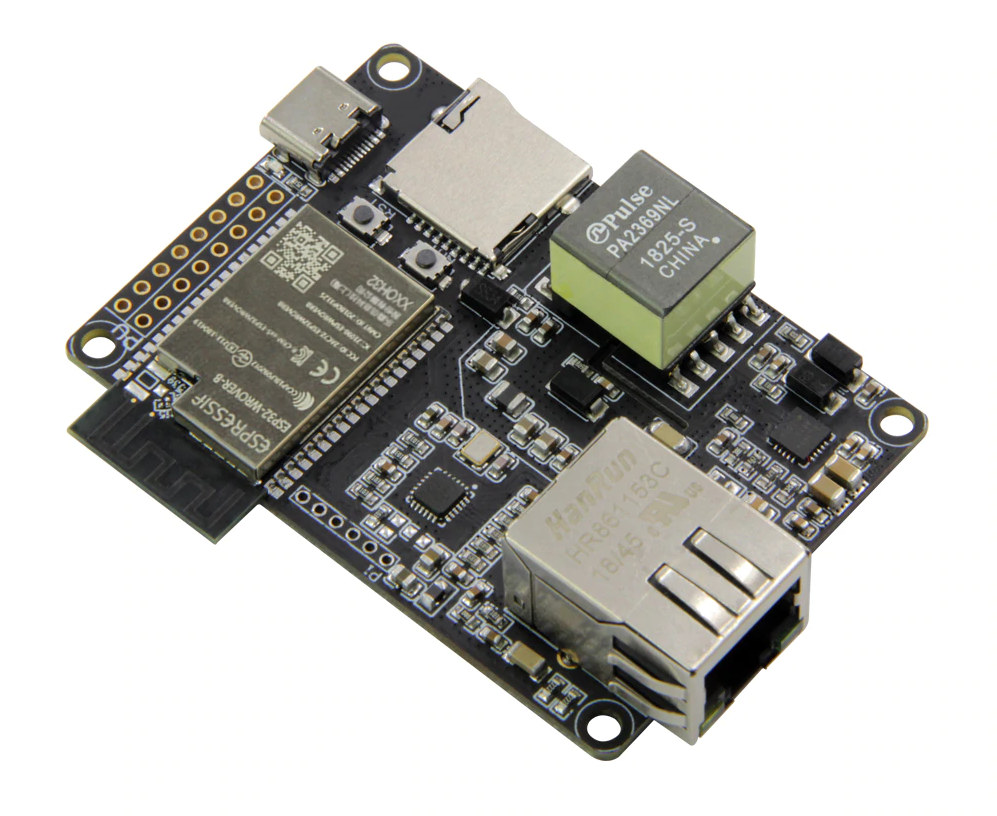I’ve recently received ODYSSEY-X86J4105 SBC with Re_Computer case, and we’ve had a look at the SBC hardware, installed some internal components like an M.2 SATA SSD, and play around Re_Computer case using Raspberry Pi 4, Beaglebone Green Wireless and Jetson Nano SBC, before assembling the Intel SBC into the enclosure. I’ve now taken the time to test the combo using the pre-installed Windows 10 Enterprise operating systems. ODYSSEY-X86J4105 is very much like any Intel Gemini Lake mini PC, but with the addition of Arduino and Raspberry Pi headers, so we’ll look at those as well. Connections and First Boot For the first boot, I connect USB mouse and keyboard, a HDMI cable to a 4K TV, an Ethernet cable, a USB 3.0 hard drive, and finally the power supply. I actually had a small problem during boot, but we’ll talk about it later as it’s really specific to my setup, […]
RFCat N32 Long Range nRF52832 Bluetooth Board Delivers 30x the Transmission Power with an Amplifier
Bluetooth 5.0 has two main new features: high speed (2Mbps) and long-range. But as we’ve seen in our nRF52840 vs nRF52832 vs nRF52810 comparison is that only nRF52840 supports Bluetooth 5.x long range. Bluetooth 5 long range is achieved with two new lower bit rates of 500 kbps and 125 kbps. So what do you do if you’d like a longer range and keep using the higher bit rates? You add a power amplifier and LNA to your board, and that’s exactly what Nikolaj (RFCat) did with RFCat N32 board based on Nordic Semi nRF52832 wireless SoC. RFCat N32 board specifications: Wireless module – Meshtek-H52 Smart Mesh Module with integrated PCB antenna based on Nordic Semi nRF52832 Arm Cortex-M4F Bluetooth 5-ready SoC (See datasheet) Skyworks RFX2401C PA &LNA with 18.9dBm TX gain and 11dBm RX gain USB – 1x USB-C port for power, programming and debugging via CP2102N USB to […]
PoE FeatherWing Brings PoE, Unique MAC Address to Adafruit Feather Boards (Crowdfunding)
[Update: In the initial version of this post, Giant Board was wrongly attributed to Silicognition LLC (Patrick Van Oosterwijck). It was actually made by Groguard] Silicognition LLC (Patrick Van Oosterwijck)’s PoE FeatherWing is an expansion board that adds PoE support to Adafruit Feather boards and can handle up to 4 Watts of power. The expansion board also comes with a built-in globally unique MAC address. It’s similar to the official Ethernet FeatherWing, but with the addition of PoE and a unique MAC address. PoE FeatherWing key hardware features and specifications: WIZnet W5500 Ethernet controller up to ~13 Mbps Microchip 24AA02E48 2 Kbit serial EEPROM with built-in globally unique MAC address to avoid having to change and recompile the code for each device. Power Isolated IEEE 802.3at Class 1, Mode A and Mode B Power over Ethernet (PoE) with up to 4W of output power available via an RJ45 Ethernet port […]
ODYSSEY-X86J4105 SBC Unboxing and Re_Computer Case Review
Seeed Studio ODYSSEY-X86J4105 is an Intel Celeron J4105 Gemini Lake SBC that also happens to integrate an Arduino compatible Microchip SAMD21 Arm Cortex M0+ microcontroller that makes it suitable as an all-in-one Arduino platform. But it can do much more with 8GB RAM, an optional 64GB eMMC flash, HDMI & USB-C DisplayPort 4K video outputs, dual Gigabit Ethernet, and support for both SATA and NVMe storage. The board runs Windows 10 Enterprise by default (if you purchase the board with an eMMC flash), and supports Linux distributions as well. Seeed Studio sent me a review sample, so I’ll start by checking out the hardware first. ODYSSEY-X86J4105 Unboxing I received ODYSSEY-X86J4105864 with a built-in 64GB eMMC flash pre-loaded with Windows 10 Enterprise. Let’s have a quick look at the board with USB, Ethernet and video output ports previously described, as well as built-in dual-band Wi-Fi 5 & Bluetooth 5.0 module, and […]
Feather-Sized Evo M51 Board Combines Atmel SAMD51 MCU with Intel MAX 10 FPGA
Arduino unveiled its first FPGA board around two years ago with MKR Vidor 4000 combining an Intel Cyclone FPGA with Microchip SAMD21 Cortex-M0+ MCU in a form factor similar to Arduino Zero. But in case you are looking for an even smaller Arduino compatible FPGA board, Alorium Technology’s Evo M51 might be exactly what you are after. The Adafruit Feather-sized board is equipped with an Atmel SAMD51 Arm Cortex-M4F microcontroller coupled with an Intel MAX 10 FPGA. Evo M51 specifications: MCU – Microchip (Atmel) SAMD51 Arm Cortex-M4F microcontroller clocked at 120 MHz with 512KB flash, 192 KB SRAM FPGA – Intel MAX 10 (10M25) FPGA with 25K LEs, 675Kbit block memory Storage – 2MB external flash USB – 1x micro USB port for power and programming I/O Digital 55x Total Digital I/O – 21x through-hole/castellated vias, 34x additional castellated-only 6x digital pins shared with analog pins 3.3V Inputs, 3.3V Outputs […]
Pandauino 644/1284 Narrow are Compact ATmega644/1284 Arduino Boards (Crowdfunding)
Pandauino 644 Narrow and 1284 Narrow boards powered by Microchip ATmega644 and ATmega1284 8-bit AVR MCU in a compact form factor slightly larger than the official Arduino Nano. The Pandaunino boards also come with up to eight times more RAM, more flash, as well as ten extra digital I/Os compared to Arduino Nano while keeping software compatibility. Pandauino 644/1284 Narrow boards specifications: MCU 644 Narrow – Microchip ATmega644 8-bit AVR microcontroller with 64KB flash, 4KB SRAM, 2KB EEPROM 1284 Narrow – Microchip ATmega1284 8-bit AVR microcontroller with 128KB flash, 16KB SRAM, 4KB EEPROM USB – 1x Micro USB port for power and programming I/Os – 24x digital I/Os including up to 8x PWM (6x max for 644 Narrow), 8x analog I/Os, 1x SPI, 2x USART, 1x I2C Power Supply – 5V input with on-board 5V and 3.3V regulators. Max current – USB: 500 mA limited by a PTC. Vin: 800 […]
ESP32 Board Features mini PCIe & SIM Card Sockets for 4G LTE Connectivity
LilyGO has launched yet another ESP32 WiFi & Bluetooth IoT board. As its name implies, TTGO-T-PCIe board includes a mini PCIe socket that coupled with a SIM card socket allowing users to insert a 4G LTE mPCIe card to add cellular connectivity. The company also offers optional SIM7000 2G or SIM7600 4G LTE modems that come with LTE and GPS antennas. You should probably be able to add other cellular mini PCiE, as well as other wireless mPCIe modems for LoRa, Satellite communication, etc… (Finally most probably not) TTGO-T-PCIe board specifications: Wireless module – ESP32-WROVER-B with ESP32 dual-core wireless SoC with 520KB SRAM, WiFi and Bluetooth with on-board antenna, as well as 4MB flash, and 8MB PSRAM Connectivity 802.11 b/g/n WiFi 4 up to 150 Mbps (ESP32) Bluetooth 5.1 LE (ESP32) Optional wireless cards via mPCIe socket (I2C and UART), SIM card slot for 2G and 4G LTE cellular networking […]
TTGO T-Internet-POE Board Provides Ethernet, PoE, WiFi, Bluetooth for $16
We’ve written about several ESP32 POE boards in the past including wESP32, but there’s now another one with LilyGO TTGO T-Internet-POE board offering Fast Ethernet, PoE, as well as WiFI and Bluetooth connectivity through ESP32-WROVER-B module. TTGO T-Internet-POE specifications: Wireless Module – ESP32-WROVER-B with ESP32 dual-core WiSoC, 4MB flash, 8MB PSRAM Storage – MicroSD card socket Connectivity 2.4 GHz 802.11b/g/n WiFi 4 and Bluetooth 5.1 via ESP32 10/100M Ethernet via LAN8720A Ethernet PHY Expansion – Unpopulated I/O header with UART, SPI, I2C, PWM, I2S, ADC; 3.3V I/O voltage Debugging / Programming Serial port via USB-C port and CP2104 USB to TTL chip (TBC) 6-pin programming interface with Tx/Rx, IO0, Reset, 3.3V and GND Misc – BOOT and reset buttons, 32.768MHz crystal oscillator Power Supply 5V via USB-C port up 50V PoE via Pulse PA2369NL transformer and HanRun HR861153C PoE compliant RJ45 jack SI3404 power management chip Dimensions – 70 x […]


